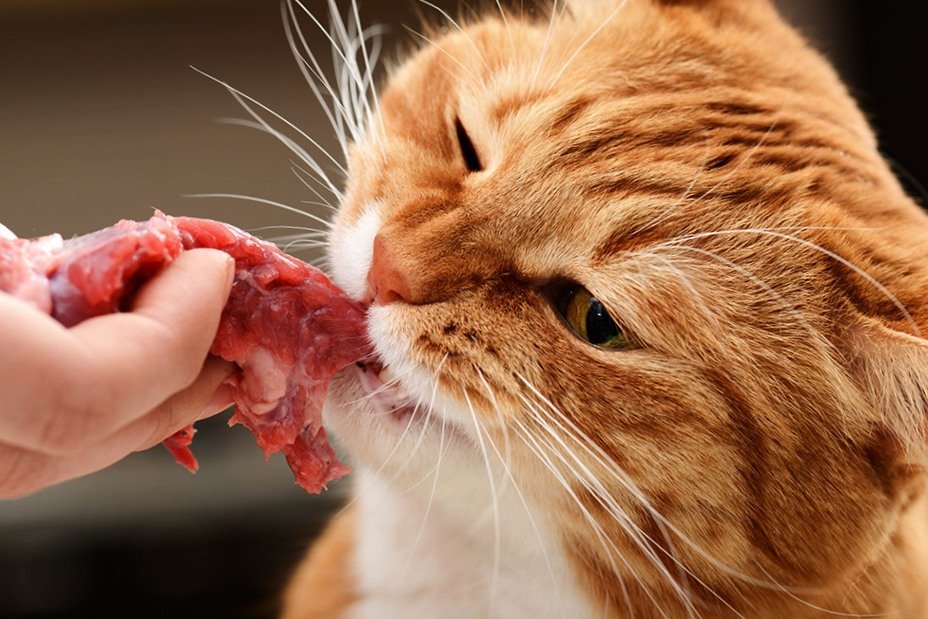As a devoted cat owner, knowing what foods are safe for your feline friend to eat is important. Cats have specific nutritional needs that are different from humans and other animals, and feeding them the wrong foods can be harmful to their health. Let’s discuss What Can Cats Eat?
This article will explore what cats can eat, from proteins like chicken and fish to vegetables like carrots and green beans. We’ll also cover grains, dairy, fruits, treats, and supplements that can benefit your cat’s health. Whether you’re a seasoned cat owner or a new pet parent, this guide will help you make informed decisions about what to feed your cat.
What Can Cats Eat? A Guide To Feline Nutrition
1- Protein
Meat
Cats are obligate carnivores, meaning their diet should primarily consist of animal-based proteins. Ideal sources include cooked chicken, turkey, beef, and lamb.
Fish
Occasional small amounts of cooked fish (such as salmon or tuna) are acceptable, but be cautious of mercury levels and ensure it’s boneless and fully cooked.
2-Carbohydrates
Cats do not require carbohydrates in large amounts. They lack the necessary enzymes to efficiently digest and utilize plant-based carbohydrates. However, small amounts of cooked rice or oats may be tolerated.
3-Fruits
Cats can enjoy small amounts of fruit as treats. So, you can choose:
- Bananas
- Apples
- Blueberries
- Strawberries
4- Vegetables
While cats don’t require a lot of vegetables, some can be beneficial. Choose cooked, plain vegetables like:
- Leafy greens: Kale, spinach, collard greens
- Carrots
- Sweet potatoes
- Green beans
- Peas
- Cucumbers
- Bell peppers
5-Grains
Cats don’t need a lot of grains, but some can be useful. Choose cooked, plain grains like
- White rice
- Brown rice
- Oats
- Barley
6-Dairy
Many adult cats are lactose intolerant and may experience digestive upset from consuming dairy products like milk or cheese. Small amounts of plain yogurt or lactose-free milk can sometimes be tolerated.
7- Supplements
Consult your veterinarian before adding supplements to your cat’s diet. Some beneficial supplements include:
- Omega-3 fatty acids
- Vitamin E
- Probiotics
8- Treats and Snacks
Commercial cat treats should be given sparingly, as they can be high in calories and lacking in nutritional value. Opt for treats specifically formulated for cats to avoid potential digestive issues.
9- Forbidden Foods
Certain foods are toxic to cats and should never be offered. These include chocolate, onions, garlic, grapes, raisins, and products containing xylitol (an artificial sweetener).
10-Hydration
Ensure your cat has access to fresh water at all times. Cats are not naturally inclined to drink a lot of water, so wet food or adding water to dry food can help increase their fluid intake.
What Can Cats Eat? Other healthy and safe foods.
What Can Cats Eat? Special Considerations
Kittens
They require a diet higher in protein and fat to support growth.
Senior Cats
May benefit from diets lower in calories and higher in fiber to support aging joints and digestive health.
Health Conditions
Consult with your veterinarian if your cat has specific dietary needs due to health concerns like kidney disease or diabetes.
Essential Nutrients for What Can Cats Eat?
Cats require a specific balance of nutrients in their diet to stay healthy. The essential nutrients that should be part of a cat’s diet include:
1. Protein:
From animal sources like meat, fish, and poultry.
2. Fat:
From animal sources like meat, fish, and poultry.
3. Carbohydrates:
Limited amounts from sources like grains, fruits, and vegetables.
4. Water:
Fresh and clean water at all times.
5. Vitamins:
A, D, E, K, B-complex.
6. Minerals:
Calcium, phosphorus, magnesium, potassium.
People Also Ask
Here are some FAQs on “What Can Cats Eat”:
Can cats eat dog food?
No, cats have different nutritional needs than dogs and should not eat dog food.
Can cats eat milk?
No, adult cats are lactose intolerant and should not consume dairy products.
Can cats eat bread?
No, bread has no nutritional value for cats and can cause digestive issues.
Can cats eat onions or garlic?
No, onions and garlic belong to the Allium family and can be toxic to cats.
Learn More About: Home Made Cat Food
Conclusion
Understanding what can cats eat? is essential for their health and well-being. A balanced diet rich in high-quality proteins, essential fats, vitamins, and minerals is crucial.
While cats are obligate carnivores and thrive on meat-based diets, they can tolerate small amounts of carbohydrates and certain vegetables. However, caution is needed with dairy products and certain human foods, many of which can be toxic. Fresh water is also vital for maintaining hydration.
